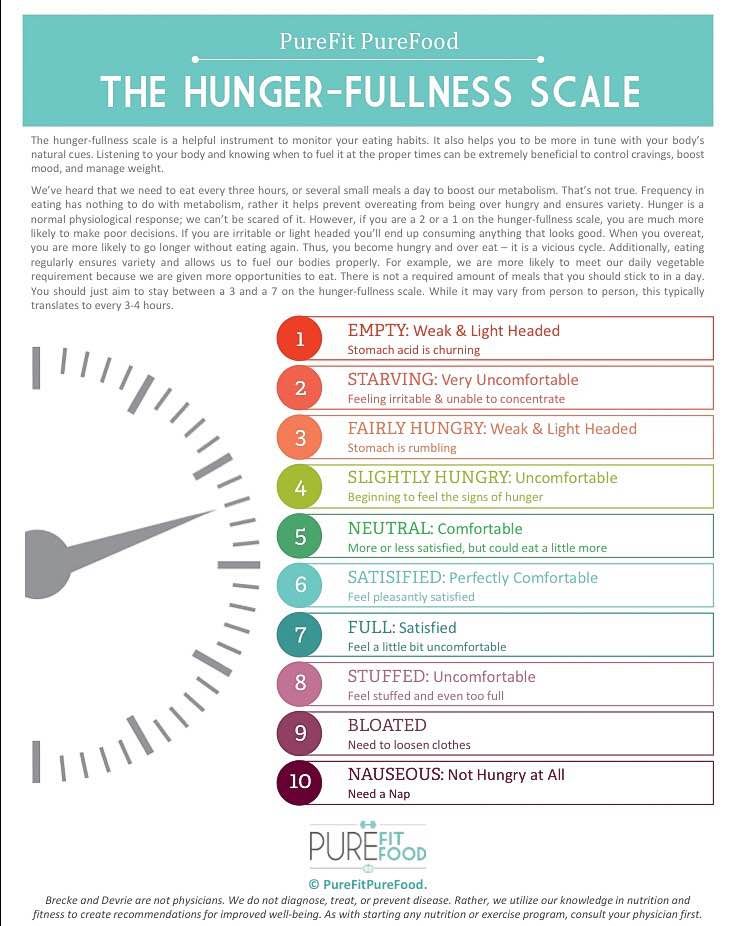
Food On The Brain
Sometimes it can be difficult to determine whether you’re having real cravings for food or if your mind is playing tricks on you. Mood plays a huge part in the types of food that we desire in the day and changes based on our emotions.
Indulging in foods that cater to our emotions often leads to feelings of guilt, which can create eating disorders of binging or restriction that can self sabotage your progress over time. We can see this occur with the obsession of calorie counting or extra strict diets that make eating food a chore and less enjoyable (see Why Changing Your Dieting Style is Irrelevant).
Determining whether we’re physically or mentally hungry is a challenge for most, since both states of the body/brain makes one feel discomfort after a period of time. There’s a difference between having true hunger and a healthy appetite for food that your body is craving.
By understanding your brain’s hunger cues you can avoid making the mistakes of under-eating or overeating the foods you enjoy and create a healthy relationship with regular eating.

Why You Experience Periods of Hunger Throughout The Day
Feeling moments of hunger can be expected when we’ve been deprived of food for long amounts of time but feels out of the ordinary when we just consumed a meal. This is even more unusual when the feelings of hunger come after a very short time of eating.
Hunger is experienced by the body’s mechanisms that release hormones when we’re deprived of food to ensure our survival. The hunger hormone is known as ghrelin, which dramatically goes down once we intake a certain amount of food in the stomach.
To conserve energy from food, the body goes through a period known as adaptive thermogenesis, which slows down metabolism to prevent it from burning too many calories. However, as you start eating more your hunger will shoot back up to adjust the metabolism back to normal levels to overcompensate. This is why you may feel hungry shortly after eating a huge meal.
This is a problem that occurs when the meals you’re consuming aren’t large enough or too many hours have elapsed since your last meal. Knowing which foods will satisfy your appetite and meet your needs for cravings is known as intuitive eating.
Knowing how to eat intuitively keeps your food consumption balanced and prevents your hormones from being unbalanced throughout the day. When we overeat or undereat, we experience moments of discomfort or food binging that creates negative associations with the food we consume.

According to this chart we should gauge when to start to prepare our meals and when to stop eating based on how we feel when consuming meals. The goal is to eat when we’re slightly hungry (levels 3-4) and stop once we feel that we’re not too full (around levels 6-7).
Hunger is also frequently experienced when the meal plates are composed of foods that are lacking nutrients and do not contribute to satiety. These are often highly processed foods or foods high in sugar content (see How to Prepare a Nutritious Meal).
To prevent experiencing moments of hunger, you can start practicing mindful eating. Mindful eating involves chewing food more slowly to become aware of the food texture and taste as you consume your meals. The body will be better at adjusting the ghrelin hormone levels down and feelings of fullness will be experienced more effectively.
Knowing the difference between hunger and appetite is also beneficial to determine whether you need to consume more or let the feelings subside. Hunger is a feeling of weakness or discomfort coupled with a desire for food, while appetite is a desire to fulfill a physical or mental need.
Most people aren’t really hungry since they don’t feel the physical discomfort of dizziness or tiredness, especially when they’ve already had a meal earlier in the day. These feelings are usually your appetite cravings that are cues based on emotions or regular times that you normally consume meals.
Coping With Hunger
There are several reasons why you may experience appetite/hunger cues that are stimulated throughout the day. This could be from eating restrictions you’ve imposed on yourself, foods you’re planning to restrict, emotional cues, or food cues from the media (television/print).
When we’re stressed, it’s very easy to experience these cues and giving in to them helps us relieve the temporary discomfort. The best way to overcome this is to remain active and busy.
Change your settings and go for a walk outside when experiencing bouts of hunger. Movement keeps the mind occupied and prevents you from reaching for unhealthy snacks or drinks you shouldn’t be consuming.
Feelings of hunger can also be a challenge for those that are intermittent fasting, as fasting creates large gaps of time that’s usually used to consume beverages or snacks. During the fasted window utilize this time to complete errands or exercise to avoid stress eating before you break your fast for the day.
The Wrap Up
Consuming food takes up large portions of the day, however experiencing hunger should not occupy our thoughts as this can make us highly unproductive. To avoid overeating or undereating you should approach eating intuitively and know the proper amount of high quality food to consume during the day. When experiencing stress, try to stay active and remain productive to avoid unnecessary eating.

Leave a Reply
You must be logged in to post a comment.